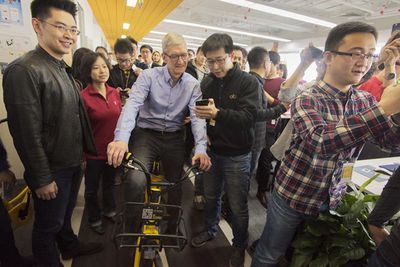Apple CEO Tim Cook sat down for an interview with Chinese media outlet Caixin on Tuesday, in which he emphasized Apple's ambitions in China and its long-term commitment to investment there.
Despite Apple's need to see off competition in the country from the likes of Chinese mobile makers Oppo and Huawei, Cook took pains to explain that Apple isn't simply in China to grab a piece of the market, but that it is actively working to create jobs and improve people's standard of living in the country.

"We're not just someone who's here to access the market," Cook told Caixin. "We've created almost 5 million jobs in China. I'm not sure there are too many companies, domestic or foreign, who can say that. … There's deep roots here. I think very highly of the country and the people in it. We're here to stay."
As reported earlier this week, Cook has spent the last few days in China to celebrate the company's announcement that it is building several research and development facilities in the region. On Wednesday he stopped in at Beijing-based bicycle sharing startup Ofo, which counts ride hailing company Didi Chuxing as one of its investors.
Apple surprised analysts last year when it bought a $1 billion stake in Didi, earning it a place on the company's board. Speaking to Caixin, Cook said the investment in Didi was an exceptional case and not a general direction for Apple.
"We've never invested in a developer before, and yet we met Didi, and Didi was so impressive. One, we thought their management was so great, we thought their idea was great," Cook said. "And we liked the holistic view, they were doing everything from taxi to the more-traditional private-car thing. There was a strategic alignment. They needed some funds to continue to grow. We really want them to be successful and be global."
Cook kicked off his China visit with a wide-ranging talk on Saturday at the China Development Forum, where he underlined his support for globalization. When asked by Caixin about the subject, the Apple CEO said there were three groups of people he always kept in mind.
"My view on globalization is that you can think of three groups of people. There's a group of people that globalization has helped tremendously. There's a group that globalization did not help. There's a group of people that globalization hurt," Cook said. "Globalization has lifted hundreds of millions of people out of poverty. But I also recognize is that it did not help everyone."
Commenting further on the recent political steps away from globalized investment, such as the protectionist policies of the Trump administration, Cook admitted it was important for policymakers to address the issues that have led to resentment by some, but said it would be a mistake to roll back the process of globalization.
"You want to keep this going because it's great. But we must fix this," Cook said. "I do think there are ways to address it. I don't think it’s an impossible task. I hope the politicians will put their attention on fixing that problem. … I'm optimistic. We must be. There are so many good things in the world. We just have to make sure we focus on the thing to fix."
Cook is likely to remain in the country until at least Friday, when Apple will launch its special edition red iPhone 7 and 7 Plus globally. Despite the missing (PRODUCT)RED branding in China, Cook told MacRumors that proceeds from sales of the red colorway iPhones will still go to help the fight against HIV/AIDS, which has been called a "looming epidemic" in the country.
Note: Due to the political nature of the discussion regarding this topic, the discussion thread is located in our Politics, Religion, Social Issues forum. All forum members and site visitors are welcome to read and follow the thread, but posting is limited to forum members with at least 100 posts.
























Top Rated Comments
Edit: note to those who upvoted this post, I did not delete the rest of my second post that had been merged to this one. That part that is now gone was in response to another post that apparently has been moderated out or deleted. I just wanted to clarify why this post looks different.
It's not really about us vs. China to me, personally. I just find it galling that Tim dismissed any notion of revitalizing manufacturing in the US, saying we don't have the people with the necessary training. But apparently he believes enough in other countries to invest in their futures. We are not the future anymore, so toss us on the rag pile.
There's nothing intrinsically wrong and a lot that's positive about investing in Asia. But it's a slap in the face to tell workers in the west where your profits were initially made and are sheltered that they're not up to snuff enough to be worth investing in.
It's also just really weird to hear the head of a company that proudly declares "Designed by Apple in California" natter on and on about globalization. Globalization on the surface sounds like a great concept. It sounds like it means unity and working together. That's what it could be if the people who actually profit off of it weren't evil dorks. In actual practice we have seen income redistribution and income inequality soar. And notice the ones who promote globalism the most are billionaires. Both liberals and conservatives who actually care about their fellow struggling citizens have noticed that.
Here, we as a society are not at all unified to do what's best for the country as a whole. We are in a race to the bottom, from CEO to consumer. Globalization speeds that race right up.
Changing our laws and placing tariffs can go only so far in a free country. China is the proverbial 500 pound gorilla holding all the cards with its state owned businesses and vast untapped markets that they say they will open if we invest and play by their rules...and then don't.
CEOs can decide where to invest. We have seen they can even decide to give money away to charities. One billion dollars spent is one billion dollars spent. Companies can spend it at home but that might mean a few vacation homes less for their executives to make a long term investment like that into their own backyard. Our markets demonstrate too often it's all about rewarding short term strategy.
One can't even say that Tim will see long term return on all of this Chinese investment. But it won't matter to him or other CEOs like him. They make their fortunes and it's the workers left to rot when the business collapses or is bought out by foreigners due to constant short term thinking.
Time and time again we have seen that China in particular is only interested in our products until they develop the means to produce and innovate on them themselves. They will happily accept Apple's investment and then recreate their own home grown version of everything Apple does and they will sell it back to our people and it will be cheaper and probably more interesting and eventually even better...cough cough...One Plus 3T.
We have globalized vast swaths of our consumers out of jobs, buying power, and relevance. It started with the blue collar workers but it's happening to white collar professionals, too. An opinion piece on Forbes summarizes what I've been reading across different sources. https://www.forbes.com/sites/mikecollins/2015/05/06/the-pros-and-cons-of-globalization/#60af9dbfccce
There is a whole industry here you don't see around shipping over American goods (made in China ironically) into China and selling it for large profits...things like MK bags, waterpiks, bad air, baby formula, and kid items. It all gets in via bribery of customs officials and China's blind eye. Go to Costco and look at people buying large quantities of the same item....guess where it's going? I've seen huge warehouses here filled with the stuff. It's a huge industry you don't even realize is here.